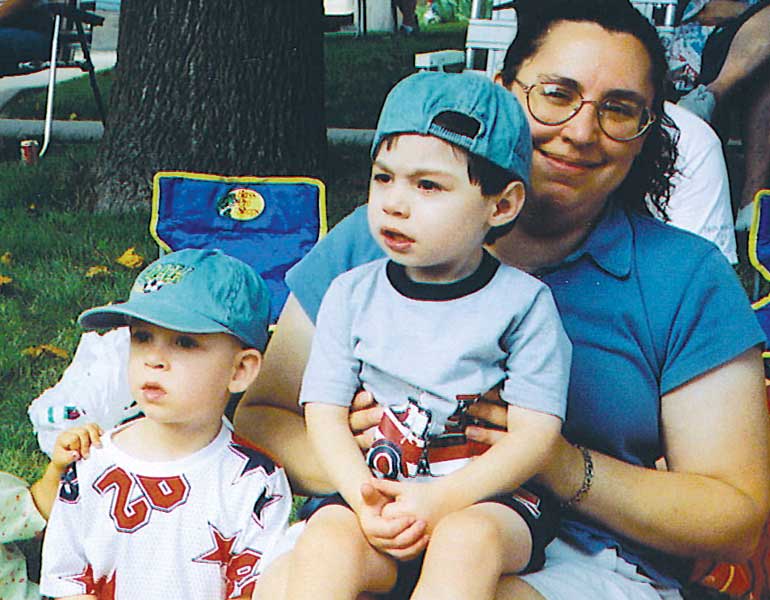My son, Tyler, is a sweet boy. Everyone says so. At a ceremony honoring our sons’ U.S. citizenship a few months after their adoptions, the mom sitting next to us gave Tyler two stickers from a coloring book.
He played with them a while, gave one to his younger brother, Jesse, then climbed over his papa’s feet and handed his other sticker to a little boy he had just met.
“What a sweet boy,” the boy’s mother said. And I nodded. But there was a time when I didn’t believe that.
It Was Fate
My husband and I planned to adopt two children at the same time. We knew the instant we saw Tyler’s photo that this was a child we wanted to meet. The 23-month-old with the intelligent look in his eyes seemed to us the perfect complement to Jesse, the 17-month-old boy with the outgoing nature whose referral we had already accepted. They would be brothers.
On our first visit to the orphanage, Jesse took to us almost immediately. Tyler was more standoffish. On our second visit, he started to play with us. He even laughed — a hoarse, unused sound that made us as sad as it did happy.
By the third visit, he was meeting our gazes. We were confident that he could accept us as his parents in time, and we eagerly signed the papers for both toddler adoptions.
The first time my mother-in-law saw Tyler’s picture, she said she felt that she knew him. She swore that he resembled my husband, Danny, at that age. When we discovered that Tyler’s birthday fell on my parents’ anniversary, we knew that this child was meant for us.
The Doubts Creep In
Within a few days of bringing our sons home, I felt very differently about our instant family. My husband went back to work almost immediately, so I was left alone with two toddlers — one of whom whined constantly.
Tyler whimpered when Jesse tried to touch him, and let out a wail every time I left the room. The only time he settled down was when he was sitting on my lap. At least, I thought, he was developing a close attachment to me, even though he refused to hold my hand and wouldn’t return my hugs.
The situation got even more difficult for me to handle. Tyler cried for attention whenever he fell down, even if he wasn’t hurt. When he thought I wasn’t looking, he hurled whatever he had — his drink, a toy — across the room. Then he whimpered and fidgeted, imploring me to get the item and return it to him.
Once in a while, he even glanced accusingly at Jesse, as though assigning him blame. I was blindsided. Where had these behaviors come from? Hadn’t I prepared by reading the right books and articles on toddler adoption?
His first tantrum was spectacular: He screwed up his face, turned beet-red, rolled on the ground, and screamed so hard that he burst capillaries in his face. He continued for more than 30 minutes, until his eyes glazed over. For the next 10 minutes, he sucked furiously on two of his fingers, gulping in air.
After that, it was like the floodgates had opened. He threw similar fits three or four times a day. I knew that my son was confused and grieving. Still, as his whining and crying became a constant din in our house, I found myself resenting him. Bitterly.
I had loved Jesse from the start. Why couldn’t I love Tyler? I was at a loss, and told my husband so. This child seems manipulative and spiteful, I said, and I didn’t really like him.
Finding solutions
All Danny and I could do was remind each other of the coincidences that had made us believe this child was our destiny. I clung to those, and to every instance I could find of parents who had problems bonding with their children, either biological or adopted. At least I wasn’t the only one.
I finally turned to my parents — and found help. My mother said to follow my instincts. “Put him in his crib if you want,” she said. “It doesn’t make you a bad parent. Sometimes you need a time-out, too.”
It was the best advice I ever got. The first time I put Tyler in his bed for a time-out, his tantrum stopped in 10 minutes. A month later, we could go three days before either of us needed a time-out. Eventually, I was also able to coax him into sucking on a pacifier instead of his fingers. I began to regain my confidence.
Over the next few weeks, I spent as much time as I could with my sons. I read to them, danced with them, rocked them, hugged them, and kissed them. Jesse loved the attention and hugged back, but Tyler was still a little distant. I had begun to like him again, but would I ever love him?
By the end of our second month as a family, Tyler laughed more often, and could play with his brother without ending up in tears. One morning, when we were playing in the living room, I stuck my tongue out at the boys. Tyler raised an eyebrow. Then he pulled out his pacifier and stuck his tongue out at me. I laughed, and realized that I did love this child. Very much.
On the day of the boys’ citizenship ceremony, Danny and I stood there, trying to get them both to stand still for a photograph. As the camera flashed, capturing the four of us together, I knew that these were the children we were meant to love.



